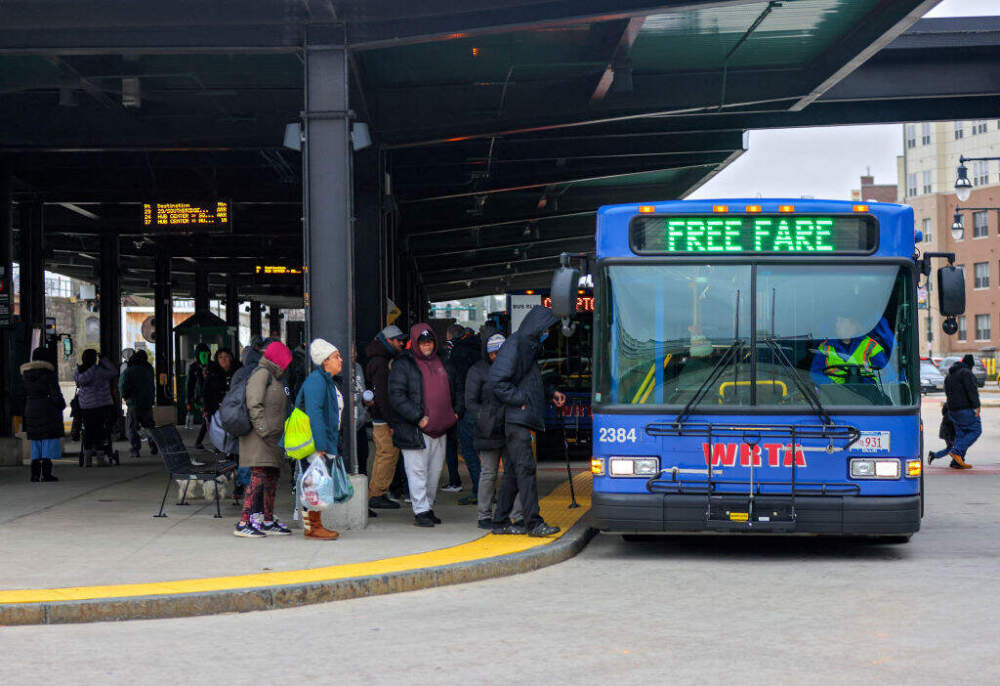Advertisement
Boston's Morning Newsletter
Worcester Regional Transit Authority extends fare-free buses for another year

Editor's Note: This is an excerpt from WBUR's daily morning newsletter, WBUR Today. If you like what you read and want it in your inbox, sign up here.
Update: This newsletter excerpt has been updated to reflect the Worcester Regional Transit Authority Advisory Board's vote to extend its fare-free bus program Thursday morning.
Don’t look now, but the championship-or-bust Celtics just got one step closer to a first-round playoff matchup with the dreaded Miami Heat.
But first, the news:
The fare-free bus keeps on rolling: Leaders of the Worcester Regional Transit Authority have moved to keep its buses free for a fifth year. The bus system — which serves Worcester and 36 surrounding communities — has not charged riders since the pandemic began in the spring of 2020. During a meeting Thursday morning, the WRTA's Advisory Board unanimously voted to extend the fare-free program through June 2025 as part of its upcoming annual budget.
- Riders like it: Seven out of 10 residents support keeping the policy, according to a recent WRTA poll. And according to The Boston Globe, the ridership in 2023 exceeded its pre-pandemic level by over 30% — making the WRTA an outlier among the state’s 15 regional transit authorities.
- Businesses are fans, too: Karen Pelletier, the executive vice president of the Greater Worcester Chamber of Commerce, told WBUR’s Dan Guzman keeping the bus system free “seems like a no-brainer.” “Transportation and access to jobs is a critical piece of being able to meet employment demand,” Pelletier said.
- What’s the long-term plan? The WRTA has been using federal COVID relief funds to make up for forgone fare revenue, which accounted for around 9% of the agency’s operating budget before the pandemic. There’s still $23 million in federal funds left — more than enough to cover a few more years of free buses. Fare-free proponents say that’s “ample runway … to encourage policymakers to invest in RTAs as the public goods that they are.”
Drowning in bills: Somerville elected officials are also frustrated by the massive catch-up water bills the city has sent to some residents. WBUR’s Walt Wuthmann and Priyanka Dayal McCluskey report hundreds of homeowners have complained about surprise water bills reaching into the thousands, due to old meters not accurately transmitting past water usage.
- How big are the bills: State Rep. Erika Uyterhoeven said she received a $4,000 water bill. Another resident, who apparently had an undetected water leak, was billed $41,000.
- What can they do about it? State law prevents the city from simply waiving the bills or even lowering the 14% annual interest rate charged on balances. For now, Somerville is offering payment plans while the city explores other assistance alternatives.
- Somerville isn’t the only one: Newton officials said last fall that 5-10% of residents were also getting large catch-up bills — some as high as $67,000.
Don’t get burned: Massachusetts officials have identified 50 lithium-ion battery fires across the state in the last six months, thanks to a new tracking tool. That’s a marked increase compared to the previous four years, when the state averaged less than 20 per year.
- The most common culprits: Nine fires involved micro-mobility devices like e-scooters, e-bikes and hoverboards; eight involved laptops and another eight were due to cell phones and tablets.
- PSA: Click here to read the state’s list of tips for properly charging and handling lithium-ion battery-powered devices.
More beds are coming to Mass General. State regulators signed off yesterday on 94 new hospital beds for Massachusetts General Hospital, bringing the state’s largest hospital to a total of about 1,000 beds. The additional beds are part of the hospital’s $2 billion expansion in Boston’s West End, slated to open in 2027.
- Despite its size, Mass General has continued to struggle with too many patients and not enough space. Priyanka reports 60 patients had to wait in the emergency room yesterday because there were no available beds — a situation that has become routine.
Biotech blues: Cambridge-based Sage Therapeutics’ stock hit a new record low yesterday, after the biotech announced it would stop work on its experimental Parkinson’s Disease drug. Company leaders said the drug was not showing any difference in test patients compared to those taking a placebo. However, they’ll keep testing to see if it has any benefits for those with Huntington’s and Alzheimer’s disease.
- Zoom out: The news is the latest in a series of setbacks for Sage. While the FDA approved its postpartum depression pill last summer, the agency rejected Sage’s drug intended for major depressive disorder, leading the company to lay off 40% of its workers. Sage’s stock, which was valued at as much as $190 a share in 2019, closed yesterday at $12.57.
P.S.— Boston’s restaurant scene got The New York Times treatment this week. Use this paywall-free gift link to browse their full list of the “25 Best Restaurants in Boston Right Now” and lock down a reservation. (Sorry, we still can’t save you from that Bagelsaurus line.)
